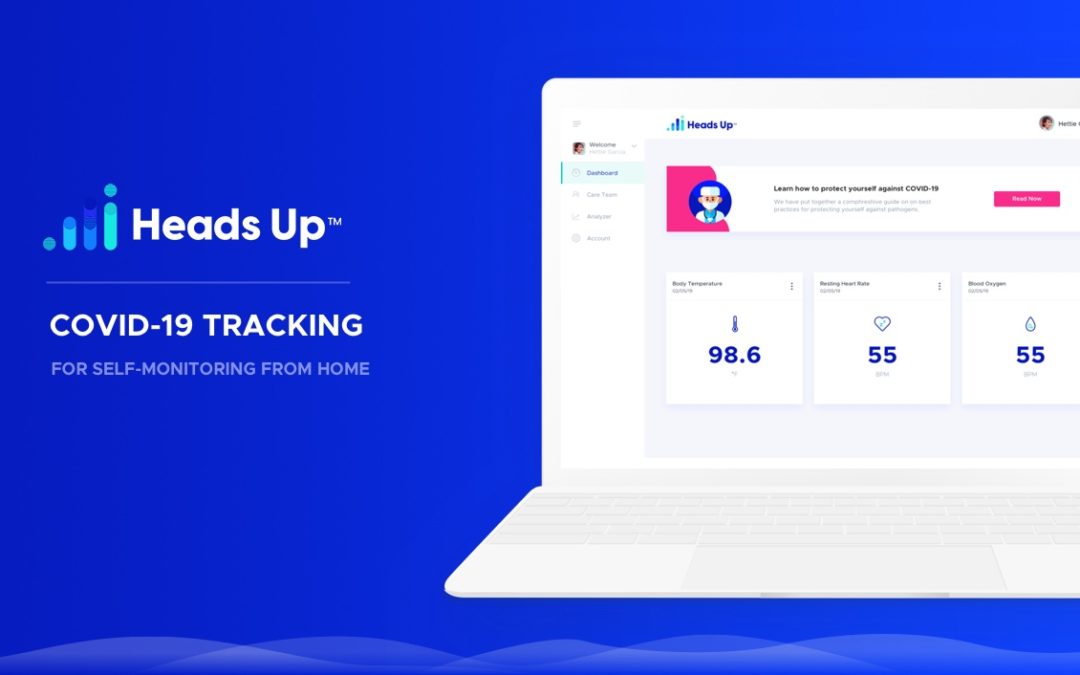
Health Monitoring During COVID-19
In times of uncertainty, confusion, and fear, especially when it comes to our health, we believe a little data can go a long way towards prevention, early detection, and peace of mind.
In that spirit, we have created a special covid-19 version of our health dashboard so you can monitor your vital signs and remotely monitor the vital signs of your loved ones – especially those at high risk.
Let’s take a look at the metrics on your personal covid-19 dashboard.
Body Temperature
The first tile on your dashboard tracks body temperature. The most common symptom of infection with the coronavirus is a fever – about 90 percent of patients suffer from it, according to the World Health Organization.
You can test body temperature with any standard glass or digital thermometer. You likely already have a thermometer sitting at home in your medicine cabinet.

For a typical adult, the normal temperature can be anywhere from 97F to 99F. That’s why testing regularly can help establish your personal baseline, which will make it easier to detect if/when your numbers start to go out of range.
Anything above 100F degrees is considered a fever. You may feel terrible, but on the whole, a fever isn’t bad for you. It’s a sign your body is doing what it should when germs invade. It’s fighting them off.
However, if your temperature is 103F or higher or if you’ve had a fever for more than 3 days, please contact your doctor. You should also contact your doctor if you have a fever with symptoms such as severe throat swelling, vomiting, headache, chest pain, shortness of breath, stiff neck or rash.
Resting Heart Rate
As our body temperature rises, our resting heart rate also rises above normal. Therefore, we can use resting heart rate as another early indicator of potential illness.
Much like your body temperature, a normal resting heart rate can vary from person to person. A normal resting heart rate for adults ranges from 60 to 100 beats per minute. That’s why it’s good to establish a baseline over several days so you know your personal resting heart rate value.
To measure your heart rate, simply check your pulse. Place your index and third fingers on your neck to the side of your windpipe. To check your pulse at your wrist, place two fingers between the bone and the tendon over your radial artery — which is located on the thumb side of your wrist.
When you feel your pulse, count the number of beats that you feel in 15 seconds. Simply multiply this number by four to calculate your heart beats per minute, then record the value on your covid dashboard.
Try to be consistent with your testing. Test at the same time each day and in the same seated position to ensure consistency.
If you think you may be getting sick and your resting heart rate starts to increase significantly above your baseline, it might be worth a call to your healthcare professional.

Blood Oxygen
If you are at home and dealing with a coronavirus infection, particularly if symptoms become severe (especially shortness of breath), testing blood oxygen can help you and your doctor determine if you should seek medication attention.
Individuals with pre-existing respiratory or cardiovascular conditions (asthma, collapsed lung, anemia, heart disease, pulmonary embolism, congenital heart defects, COPD) are at higher risk during the coronavirus outbreak.
If you are one of these individuals you may wish to closely monitor your blood oxygen levels with a pulse oximeter. If you don’t yet own a device they can be easily purchased online for approximately $30.
This device measures oxygen saturation and refers to the extent to which hemoglobin is saturated with oxygen. Hemoglobin is an element in your blood that binds with oxygen to carry it through the bloodstream to the organs, tissues, and cells of your body.
Normal oxygen saturation is usually between 96% and 98%. If your levels are below 90% or you are feeling shortness of breath, please contact your healthcare professional.
Blood pressure
The last item on your dashboard is for blood pressure. Much like blood oxygen, tracking this metric is mainly intended for those with pre-existing cardiovascular conditions who may be at higher risk if exposed to coronavirus.
If you think you are at higher risk, regularly tracking blood pressure levels can be very helpful in the event you need to seek medical attention. Your doctor can review your readings which can help with appropriate treatment.
Like all the metrics discussed here, consistency is very important. Take readings after you’ve been sitting still for a few minutes and try to test at the same time each day and in the same seated position.

Summary
Some simple self-monitoring can be very helpful for you and your loved ones. The data can provide some peace of mind for those not exhibiting symptoms. For those who are experiencing symptoms, depending on the severity, the data can mean the difference between knowing when to seek medical attention and when to stay home.
Our covid-19 dashboard is free during the current global pandemic as our way of contributing to the greater good.
If you have questions about the dashboard, feel free to shoot us an email at support@headsuphealth.com
If you have questions about your health, please contact your doctor.

Disclaimer: The content in this post is not intended to be a substitute for professional medical advice, diagnosis, or treatment. Always seek the advice of your physician or other qualified health provider with any questions you may have regarding a medical condition. Never disregard professional medical advice or delay in seeking it because of something you have read in this post.



















